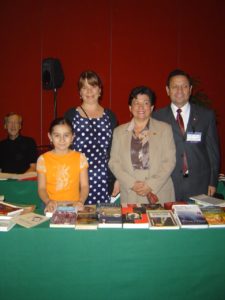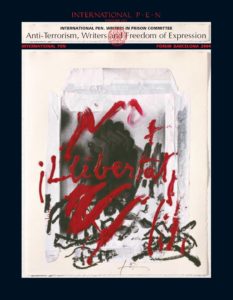PEN Journey 29: Mexico City and the Road Ahead—Part II, Substance
PEN International celebrates its Centenary in 2021. I’ve been active in PEN for more than 30 years in various positions and now as an International Vice President Emeritus. With memories stirring and file drawers of documents and correspondence bulging, I am a bit of a walking archive and have been asked by PEN International to write down memories. I hope this personal PEN journey will be of interest.
The 2003 International PEN Congress in Mexico City celebrated the First Congress of the Americas. Hosted by Mexican PEN, it was also supported by Canadian PEN, Quebecois PEN, American PEN, and the Latin American PEN Foundation. Organized around the theme of “Cultural Diversity and Freedom of Expression,” the 69th Congress welcomed delegates from 72 PEN Centers from every continent except Antarctica.
As well as reporting on the welcoming of new centers, Part 1 of PEN Journey 29 recounted an historic Charter amendment, major rules and regulation changes and a strategic plan—the nuts and bolts and essential frame for any organization, especially one as complex as International PEN as it sought to modernize its governance and structure. In Part II the focus turns to the substance of PEN’s work and of the 2003 Congress.
The final gathering under the presidency of Mexican poet and novelist Homero Aridjis, PEN’s 69th World Congress hosted more than 250 participants, speakers and guests, including Nobel laureate and PEN International Vice President Nadine Gordimer and also listed on the literary programs Nobel laureate and former PEN International President Mario Vargas Llosa and many writers from the Americas—Michael Ondaatje, John Ralston Saul, Francine Prose, Andrés Henestrosa and writers from at least 12 indigenous regions and languages in Mexico—Huichol, Maya, Mazahua, Mazatec, Mixtec, Náhuatl, Tenec, Tojolab’al, Tzotzil, Wuirárica, Yoleme, Zapoteca.

PEN International 69th Congress. L to R: Deborah Jones (PEN USA West), Jens Lohman (Danish PEN), Isobel Harry (Canadian PEN), Terry Carlbom (PEN International Secretary), General José Francisco Gallardo (former PEN main case) and his family; Nadine Gordimer (PEN International Vice President) and General Gallardo; General Gallardo, translator, and Jens Lohman (photos courtesy of Sara Whyatt)
Homero Aridjis noted: “The Congress programs explore the literature of the Americas, of Canada, the United States and Latin America, shining a particular light on the indigenous literatures which are so essential to understanding the cultural map of our continent from Chile to Canada.”
“At this Congress indigenous, native literature became a part of International PEN through presentations,” Carles Torner, Vice Chair of the Translation and Linguistic Rights Committee told the Assembly though he noted the Indian languages were still not represented in the Assembly. “But for many years to come the Mexican Congress will be remembered as the Congress at which indigenous literature entered PEN.”
Mexican PEN President María Elena Ruiz Cruz reflected that the Congress theme “Cultural Diversity and Freedom of Expression” gave PEN the opportunity to work on two essential aspects of its core mission—respect for human rights of those whose medium is the word and respect for sovereignty and cultural diversity, which is essential in the face of increasing anti-democratic tendencies.
One of PEN’s main cases Mexican Brigadier-General José Francisco Gallardo Rodríguez addressed the Assembly, thanking PEN for all its efforts on his behalf. Released from prison just the year before, he said that without the work of PEN’s Writers in Prison Committee, it would have been very difficult to obtain his release. He asked his wife to address the Assembly.

Book display at PEN 69th Congress. Lucy Popescu (English PEN), Señora Gallardo, General Gallardo and their daughter (In background Eugene Schoulgin (WIPC Chair) (photo courtesy of Sara Whyatt)
Señora Gallardo said her husband had spent eight years and three months behind bars. To this Congress they had brought the many books that had been sent to him by PEN members when he was in prison, books in many languages. They were displaying them at the book festival in the conference hall. These books had helped him endure imprisonment. “The windows were opened; there were no walls for him; he did not feel he was in prison,” she said because of these books. They would visit him and instead of finding someone who was inhibited and shy, he was the opposite and would encourage them to keep fighting. With PEN’s support they had been able to obtain his freedom. They received 35,000 letters, some of which delegates could see in the boxes they had also brought with them. It was the strength of that ink that had enabled her husband to be with PEN on this occasion, she said.
General Gallardo told the delegates that on November 9, 1993 he had published an article on reforming the army in a military magazine. From that moment he had been persecuted by the military high command who had tried to take away his right to free speech, a right—as he had told them—that was enshrined in the Mexican constitution. For this he had been imprisoned for eight years and three months. The high command had harassed his family, attempting kidnapping and shooting, but he was convinced that they had survived because they had stayed firm. His stand on freedom of speech had started a debate on one of the prohibited subjects in Mexico—the army. He had also acted in defense of freedom in teaching and in research as a university student; his article was the result of research he had undertaken on the need to greatly reform the Mexican army. It had created considerable conflict in Mexico and had demonstrated that to do away with the culture of impunity in Mexico and to transform the Mexican state, first the army must be reformed—it must be returned to its barracks so that democracy and justice could be achieved in Mexico.
International Vice President Nadine Gordimer expressed her great concern, which she knew was shared by everyone, she said, at what had been happening for the past ten years to mainly young and poor women, and some students and workers. She wanted to propose the recording of the Congress’s condemnation regarding the murders of women in Ciudad Juarez. She did not know whether there had been any inquiry into the torture and abductions of these young women in towns on the Mexican-American border or a great deal about their circumstances, but they seemed to be young and poor and defenseless and because PEN was concerned for human dignity as well as having very strong feelings about violence and victimization, she felt it would be appropriate for PEN to ask for an enquiry into the whole matter. A letter of concern and protest was drafted and signed by delegates and PEN’s leadership to Mexico’s President Vicente Fox, who was listed on the as attending the Congress’ Opening Ceremony.
At the Congress PEN’s Writers in Prison Committee delivered two reports—one on Freedom of Expression and Impunity Campaign and the other on Anti-Terrorism, Writers and Freedom of Expression. Isobel Harry of Canadian PEN reported that the Freedom of Expression and Impunity Campaign launched with assistance of Canadian PEN, American PEN and WiPC headquarters last year at the San Miguel de Allende WiPC Conference and had produced a study of over 400 cases of murders of writers since 1992. It also produced a handbook on how to campaign against killings with impunity. PEN had highlighted cases of killings with impunity for the UN Commission on Human Rights where a submission had been made. PEN called upon the United Nations, the Inter-American Commission on Human Rights of the Organization of American States and national governments to bring to justice those who employed murder as a tool of censorship. The Impunity report, published in English and Spanish and the handbook was available to all centers, and an Impunity Watch was being set up to alert PEN members to react to killings as soon as they were reported.

Anti-Terrorism, Writers and Freedom of Expression report issued by PEN International at 2003 Congress
Joan Smith of English PEN reported on the Anti-Terrorism, Writers and Freedom of Expression report which grew out of PEN’s London meeting in November 2001 shortly after the 9/11 attacks on the United States. In this report just published in English, French and Spanish 35 countries had been identified where “anti-terror” actions curtailed free speech and challenged legitimate protest in France, Britain, Russia, Israel/Palestine among others. The situation had also led to alliances between the U.S. and countries with poor human rights records such as Uzbekistan. The “war on terror” can empower those who use violence, she said, legitimizing them as much as suppressing. The report was distributed at the meeting and would be given to PEN Centers’ local news media and also to Foreign Offices.
Eugene Schoulgin, Chair of the Writers in Prison Committee, noted in his 2003 Report to the Congress, “We have deep concerns that the called fight against international terrorism has in far too many countries and situations become a tool in the hands of those in whose interest it is to silence intellectual criticism and persecute writers and journalists who raise their voices in protest. The legislation in defense of the right to free expression is weakened and more short time sentences and many more cases of harassment are reported to us.”
The Assembly passed Writers in Prison Committee resolutions condemning attacks on writers and limitations on freedom of expression and impunity in the Americas, Algeria, Belarus, China, Cuba, Ethiopia, Iran, Italy, Myanmar (Burma), Russia, Syria, Tunisia, Turkey, Uzbekistan, Vietnam, USA, and Zimbabwe. These resolutions were added to by resolutions from the Translation and Linguistic Rights Committee on Minorities in Russia and on linguistic rights of Kurds in Turkey, Iran and Syria. Resolutions from the Peace Committee focused on Israel & Palestine and Chechnya.

Jiří Gruša, new PEN International President
At the 2003 Congress Homero Aridjis stepped down after six years as President. Only one candidate was presented for the office: Jiří Gruša, Czech/German writer and a close colleague of PEN Member playwright Václav Havel, who had once been a PEN main case when he was imprisoned and later had served as President of his country. Václav Havel had finished his term of office earlier that year and had been approached to stand as President of International PEN. Instead he recommended his close friend Jiří Gruša, nominated by Austrian PEN.
Wolfgang Greisenegger of Austrian PEN told the Assembly that Jiří Gruša was not only a poet, essayist and novelist and fluent in Czech and German, he was also a journalist of conviction “who would always fight for the right cause, in the best PEN tradition.” As a dissident and a close friend of Václav Havel, he had paid dearly for his convictions, both by being forbidden to publish his work and by imprisonment and loss of his citizenship. However, his struggle on behalf of freedom of expression had led him to continue even under the worst conditions of a communist regime as a publisher and reader, first in Czechoslovakia and then in exile in Germany. His voice could not be silenced, and he moved not one inch toward totalitarianism. Under the new republic he was appointed Czech Ambassador in Germany by Havel, and he later served his country in the same capacity in Austria. But even as a diplomat and civil servant, he never ceased to be a free intellectual, daring to speak out when necessary. “Freedom fighter, dissident and experienced diplomat makes him ideal to be PEN’s next International President.”
Cecilia Balcazar of Colombian PEN seconded the nomination. Others noted Jiří Gruša had also been a signatory of the famous Charter 77 which had preceded the overthrow of the communist regime in Czechoslovakia.
After discussion on the need for having a wider choice of candidates in the next election, Jiří Gruša addressed the Assembly. He stressed that he had lived more than half his life under regimes that had suppressed freedom. He came from a small nation that had been forced to fight for its language and its statehood, and he knew firsthand that a state and a language did not automatically guarantee freedom.
In his official statement, he said, “International PEN, the only organization above and beyond all national and cultural borders, draws its strength from the amicable and responsible cooperation of its authors. It unites the diversity of languages and thus is given a more diversified mission. In addition to the defense of the freedom of the word comes a battle for the multiplicity of linguistic innovation for the ability to create a metaphor of our being. These are the hallmarks of every literature and they form the basis of our international standing. The men and women gathered in International PEN pursue writing as an art, and are ready to assume all the needed risks. H.G. Well’s slogan—no politics under any circumstances—remains valid, even if it has become more politicized. Today it also means leaving room for the free expression of metaphoric quality—irrespective of governments.” Jiří Gruša was elected the next President of International PEN.
In the limited free periods at the Congress delegates also explored the city. Homero had pointed out that Mexico City was the historic, political and economic center of the Mexican civilization with ubiquitous archaeological ruins in the city. He noted that Mexico had received via Spain, the contributions of the European and Arab cultures, including the Spanish language, the Judeo-Christian religion, the university, the printing press and a pluralistic concept of living. In the past Mexico had been the cultural bridge between the Old and New Worlds, and in the present thanks to its geographic place and the lives of its people, it was the border and the meeting place between North and South America. It was both a recipient of and a catalyst for cultural diversity that encompassed past, present and future, he observed. “I sincerely believe that without cultural diversity, the only force capable of counterbalancing unrestrained and denationalized globalization, we will not be able to understand the world of the 21st century.”

Exploring ruins in Mexico City during PEN International’s 69th Congress. L to R: Joanne Leedom-Ackerman (PEN International Vice President), Fawzia Assaad (Swiss Romand Center), Deborah Jones (PEN USA West); Deborah Jones, Jay Corcoran (PEN America), Fawzia Assaad, Eric Lax (PEN USA West), Joanne Leedom-Ackerman, Michael Roberts (PEN America); Mike Roberts, Eric Lax, Fawzia Assaad
Next Installment: PEN Journey 30: Barcelona: A Surprise
June 2003, Mexico City.Closing event of the PEN International Congress in Mexico City, dinner gala at the Plaza del Zócalo, in the capital city’s town hall. Time for dessert, speeches, and poetry readings. First there were three foreign poets, reading in their mother tongue, followed by the English translation. Then, three poets in Mexican indigenous languages. I had spent the days of the congress with the indigenous writers, talking about the challenges they faced and how to integrate their literatures into the great dialogue of literatures that is PEN International. That night, the first to read her lines was the Mayan poet Enriqueta Lúnez: she read her poem in the Tsotsil language, followed by the translation in Spanish, and that was it. She returned to her seat. Which is to say: the delegates from across the globe, who had listened to European, African and Asian poets translated into English, could not understand the poem of the Mayan poet because the organizers hadn’t realized they should also translate it into English. In fact, Enriqueta and the other indigenous poets had already told me at the table during dinner: “We’ll read at the end, it’s always like that: we’re the goldfinches. They really like to hear how we chirp.” Now I understood: the intention wasn’t for attendees to understand what they said, just for them to hear the sound of the indigenous language. An inner spring released, I jumped to the stage in a bound, I took the poem Vayijel that Enriqueta had just read, I addressed myself to all the congress attendees, and I improvised a translation of the poem into English from the Spanish. And then it happened: in the moment that I finished reading, at the table of the presidency, someone I didn’t know stood up and stared at me fixedly. He left the room. Walking slowly, ostentatiously. They told me later who he was, that intellectual who made himself out to be a liberal, who wanted all to know he did not agree with the Mayan poets also being translated into English, being welcomed as any other to our dialogue. Being part of the beloved Babel of PEN.
This is our privilege: our internationality might be vulnerable, but it is flexible and welcoming. Our world map is not fixed: it is variable. Welcome to PEN, writers in Mayan, Zapotec, Nahuatl, Inuit, Ojibwe, Mapuche, Quechua, Aymara, and the Adivasis of India’s so-called “tribal belt”, the aboriginal Australians and the Maoris and… and the Kurds.
Thank you for this important memory reposted from the Dissident blog.
https://www.penopp.org/articles/mother-tongue-babel